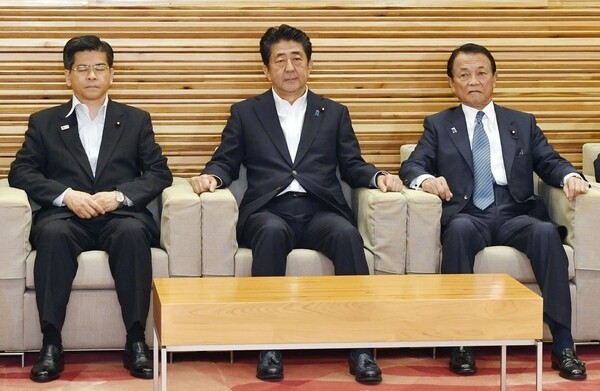hankyoreh
Links to other country sites 다른 나라 사이트 링크
Abe’s advisors pushed export controls despite calls for caution by METI, Asahi Shimbun reports

The Japan Prime Minister’s Official Residence, an organization of advisors to Prime Minister Shinzo Abe, pushed through export control measures against South Korea over calls for a more cautious approach from the presiding Ministry of Economy, Trade and Industry (METI), with the final decision made on June 20 eight days ahead of the opening of the G20 Summit, a Japanese news outlet reported. The report contradicts previous ones suggesting that METI spearheaded the hardline approach over calls from the Japanese Ministry of Foreign Affairs (MOFA) for a more prudent stance.
The Asahi Shimbun newspaper reported on Oct. 18 that officials in the Abe administration spearheaded the export control measures, with one of them quoted as saying that “it’s important that you land the first punch in a fight” and that “[Japanese] public opinion will follow along.” Some voices in Japan had been calling for export control measures in South Korea since early this year. A lawmaker present at a Jan. 30 meeting at the headquarters of the ruling Liberal Democratic Party (LDP) proposed “considering the suspension of [South Korea’s] designation as a ‘white list’ country [benefiting from expedited export procedures].” The Japanese government had already been examining “opposition [retaliation] measures” in response to a South Korean Supreme Court ruling last year ordering compensation for forced labor conscription, while the presiding METI generally advocated a more cautious approach, the newspaper said. A METI official, speaking on condition of anonymity, was reported as saying, ”When your fists land once you raise them [. . .] will have a big [negative] effect after they do.” But officials in the Abe administration rode over the calls for greater caution, the newspaper said.
Export control decision made eight days before G20 summit
Ultimately, a meeting was held in the office at Abe’s residence on June 20 – attended by Kazuyuki Furuya, the assistant chief Cabinet secretary; Takeo Akiba, the vice minister for foreign affairs; Kenji Kanasugi, then-director of MOFA’s Asia-Oceania bureau; and Takashi Shimada, then vice minister of economy, trade and industry – where the decision was made to intensify export controls against South Korea, the report said. At the same time, the decision was kept secret in consideration of the G20 summit that was set to take place in Osaka eight days after the meeting, the newspaper added – a reflection of the contradiction between Japan announcing its export control decision against South Korea while also spearheading a statement as a G20 chair nation emphasizing the importance of free trade.
The Abe administration’s announcement of the South Korean export control measures finally came on July 1, two days after the G20 Summit had ended. With the official announcement of the House of Councillors election set to take place three days later on July 4, the Abe administration also took public opinion within Japan into account, the newspaper said.
By Cho Ki-weon, Tokyo correspondent
Please direct comments or questions to [english@hani.co.kr]
Editorial・opinion
![[Column] When ‘fairness’ means hate and violence [Column] When ‘fairness’ means hate and violence](https://flexible.img.hani.co.kr/flexible/normal/500/300/imgdb/original/2024/0516/7417158465908824.jpg) [Column] When ‘fairness’ means hate and violence
[Column] When ‘fairness’ means hate and violence![[Editorial] Yoon must stop abusing authority to shield himself from investigation [Editorial] Yoon must stop abusing authority to shield himself from investigation](https://flexible.img.hani.co.kr/flexible/normal/500/300/imgdb/original/2024/0516/4417158464854198.jpg) [Editorial] Yoon must stop abusing authority to shield himself from investigation
[Editorial] Yoon must stop abusing authority to shield himself from investigation- [Column] US troop withdrawal from Korea could be the Acheson Line all over
- [Column] How to win back readers who’ve turned to YouTube for news
- [Column] Welcome to the president’s pity party
- [Editorial] Korea must respond firmly to Japan’s attempt to usurp Line
- [Editorial] Transfers of prosecutors investigating Korea’s first lady send chilling message
- [Column] Will Seoul’s ties with Moscow really recover on their own?
- [Column] Samsung’s ‘lost decade’ and Lee Jae-yong’s mismatched chopsticks
- [Correspondent’s column] The real reason the US is worried about Chinese ‘overcapacity’
Most viewed articles
- 1China calls US tariffs ‘madness,’ warns of full-on trade conflict
- 2[Column] US troop withdrawal from Korea could be the Acheson Line all over
- 3[Editorial] Yoon must stop abusing authority to shield himself from investigation
- 4[Column] When ‘fairness’ means hate and violence
- 5[Column] How to win back readers who’ve turned to YouTube for news
- 6US has always pulled troops from Korea unilaterally — is Yoon prepared for it to happen again?
- 7[Book review] Who said Asians can’t make some good trouble?
- 8Naver’s union calls for action from government over possible Japanese buyout of Line
- 9Could Korea’s Naver lose control of Line to Japan?
- 10[Editorial] Korea must respond firmly to Japan’s attempt to usurp Line